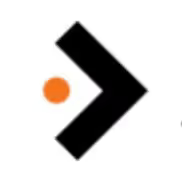Cognism Alternatives
Find your Cognism alternative. This guide compares 10 tools on data, features, and pricing to help you make an informed choice.

Cognism is a go-to tool for many sales teams, and for good reason. It performs well when you need a B2B database or a phone number finder, particularly for contacts in Europe. The data quality in this region is often a key strength.
However, some users report that contact information can sometimes be outdated, and the pricing might be high for smaller teams. We analyzed the top alternatives to help you find the right fit for your needs. Let's get started.
Consider 11x Digital Workers
Consider adding digital workers to your sales process for specific tasks. 11x provides autonomous agents that can handle research and parts of your outreach.
11x provides a GTM platform where AI agents manage the sales process. The agent Alice finds prospects, runs outreach on email and LinkedIn, and updates your CRM. Julian, another agent, qualifies inbound leads and books meetings. This consolidates tools for data enrichment, outreach, and email warmup.
Cognism Alternatives
Here is a detailed review of the top Cognism alternatives. We analyze each tool's pricing, features, and its specific pros and cons when compared to Cognism.
1) ZoomInfo SalesOS
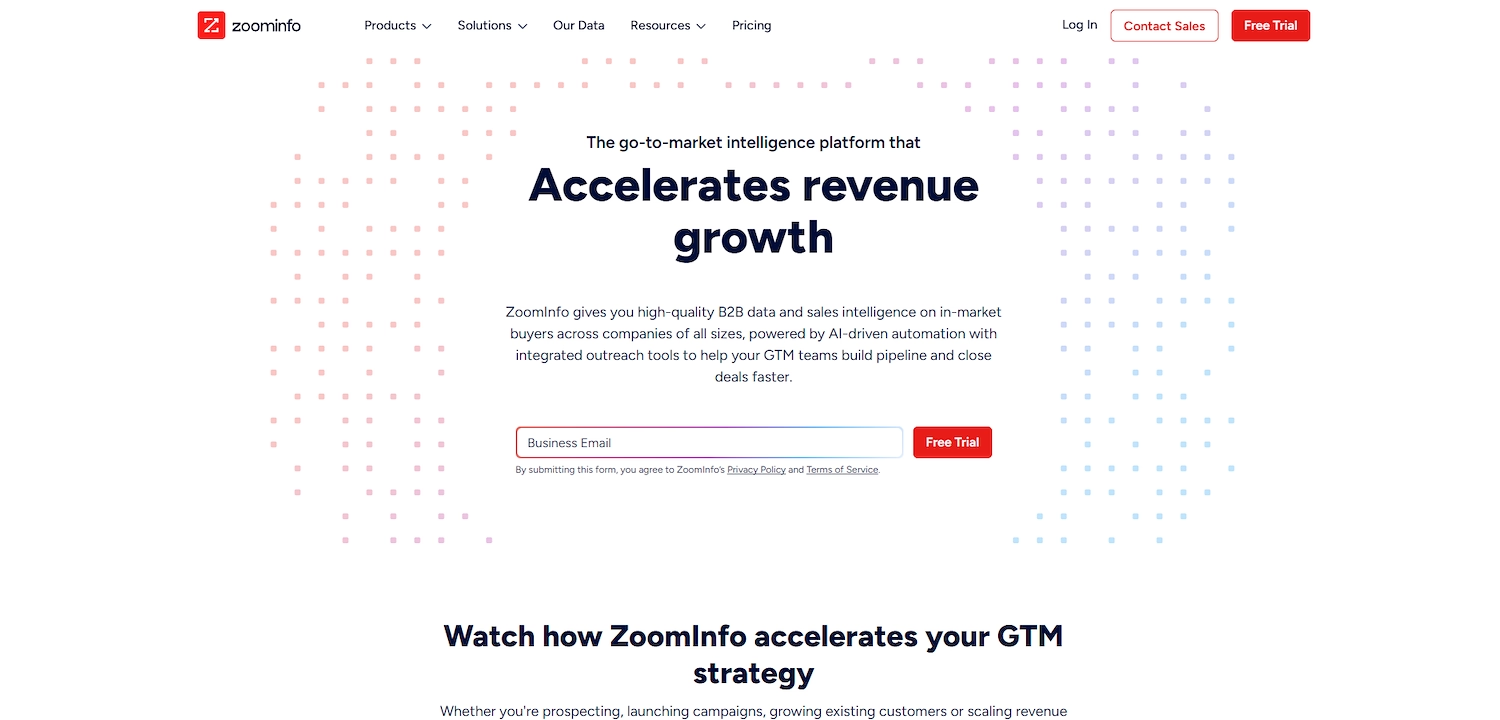
ZoomInfo SalesOS is a go-to-market platform that provides contact and company data. It helps teams identify and connect with buyers through its database and engagement tools. Users can build lead lists with verified contact information for sales outreach or to source candidates. The platform unifies data, buyer intent signals, and automation into a single system for sales, marketing, and operations teams to use for their campaigns and workflows.
ZoomInfo SalesOS's Main Features
- Analyzes call and meeting interactions with its conversation intelligence tool, Chorus.
- Identifies anonymous website visitors and turns page views into pipeline.
- Offers a generative-AI companion, Copilot, to surface insights and draft outreach.
- Provides a planning and design tool, GTM Studio, for revenue operations.
How ZoomInfo SalesOS Compares to Cognism
Average Review score: 4.5/5 stars based on 8,738 G2 reviews.
- ZoomInfo SalesOS includes a conversation intelligence tool, Chorus, to analyze sales calls and meetings. This provides interaction insights not available within Cognism's core data platform.
- Its generative AI companion, Copilot, gives recommendations on who to contact and drafts outreach messages. This is a more advanced feature compared to Cognism's data enrichment focus.
- The platform integrates sales engagement tools, allowing teams to run outreach campaigns directly. This differs from Cognism, which often requires exporting data to a separate engagement tool.
- It provides data orchestration to clean and unify customer data across systems. This offers a more comprehensive data management solution than Cognism's database-centric approach.
Potential Drawbacks Compared to Cognism
- Some users find that ZoomInfo's data accuracy in Europe can be inconsistent. Cognism, in comparison, often provides more reliable contact information for this specific geographical area.
- The platform's mobile numbers are sometimes less reliable than Cognism's Diamond Data. Cognism manually verifies these numbers, which can lead to higher connect rates for sales teams.
- Its extensive feature set can require a longer implementation time. In contrast, teams that need a more straightforward data solution might find Cognism simpler to adopt and integrate.
Pricing and Cost-Effectiveness
Both ZoomInfo and Cognism use custom quote-based pricing, and users perceive both as a significant investment. While specific costs vary, user-reported data suggests Cognism may offer a faster return on investment at 10 months, compared to 14 months for ZoomInfo.
2) Apollo.io
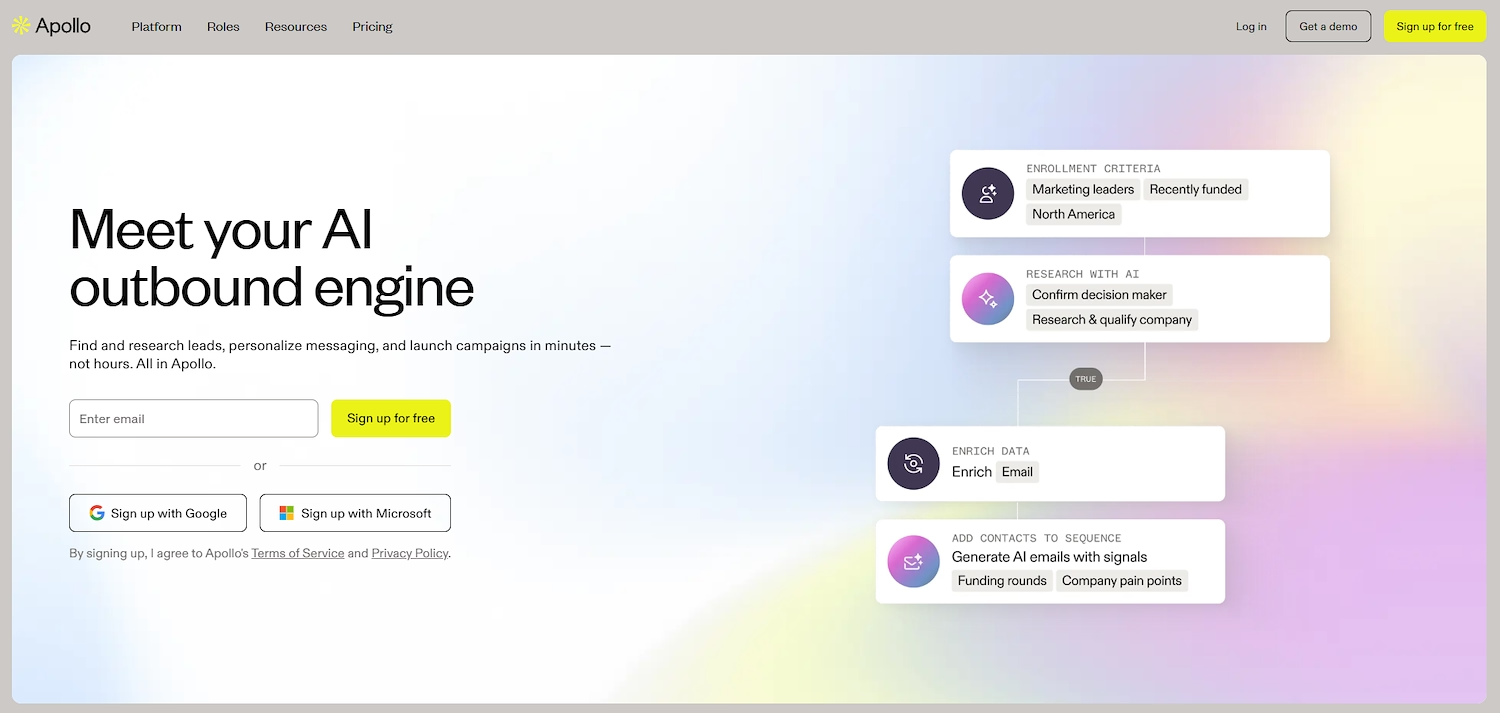
Apollo.io is a sales intelligence platform that combines a large B2B database with engagement tools. It provides verified emails and direct-dial phone numbers for sales teams to find prospects. Users build targeted lists, enrich CRM data, and can manage outreach campaigns within the same system.
Apollo.io's Main Features
- It combines a B2B database with engagement tools to manage outreach campaigns within the same system.
- The platform provides verified emails and direct-dial phone numbers for sales teams to find prospects.
- Users can build targeted lists to segment potential customers for outreach.
- It offers data enrichment to update and complete contact records within a CRM.
How Apollo.io Compares to Cognism
Average Review score: 4.7/5 stars based on 8,904 G2 reviews.
- Apollo.io integrates sales engagement tools for direct outreach. This contrasts with Cognism's focus on data provision, which often requires export to other campaign systems.
- The tool offers transparent pricing plans, including a free option for single users. This provides more flexibility for small teams compared to Cognism's custom quote-based model.
- It provides access to a database of over 210 million contacts. This large scale offers a broad pool for prospect discovery, while Cognism is often noted for its data depth in the European market.
- Its intelligence engine gives recommendations to help with the sales process. This adds an analytical layer that is different from Cognism's primary function as a contact database.
Potential Drawbacks Compared to Cognism
- Some users report that Apollo.io's data for European markets can be less accurate. In comparison, Cognism often provides more reliable contact information for this region due to its focused data verification process.
- Its mobile phone data may not always be as accurate as Cognism's. Cognism offers Diamond Data, a feature where mobile numbers are manually verified, which can lead to better connection rates for sales outreach.
- The tool's approach to data compliance might require more user scrutiny. Cognism, in contrast, builds its platform with a strong emphasis on GDPR, which provides more assurance for teams that operate in Europe.
Pricing and Cost-Effectiveness
Apollo.io offers transparent pricing with a free tier and paid plans starting at $49 per user, making it accessible for smaller teams, while Cognism uses a custom quote-based model for enterprise packages. You can check the detailed pricing on Apollo.io's official website.
3) Lusha
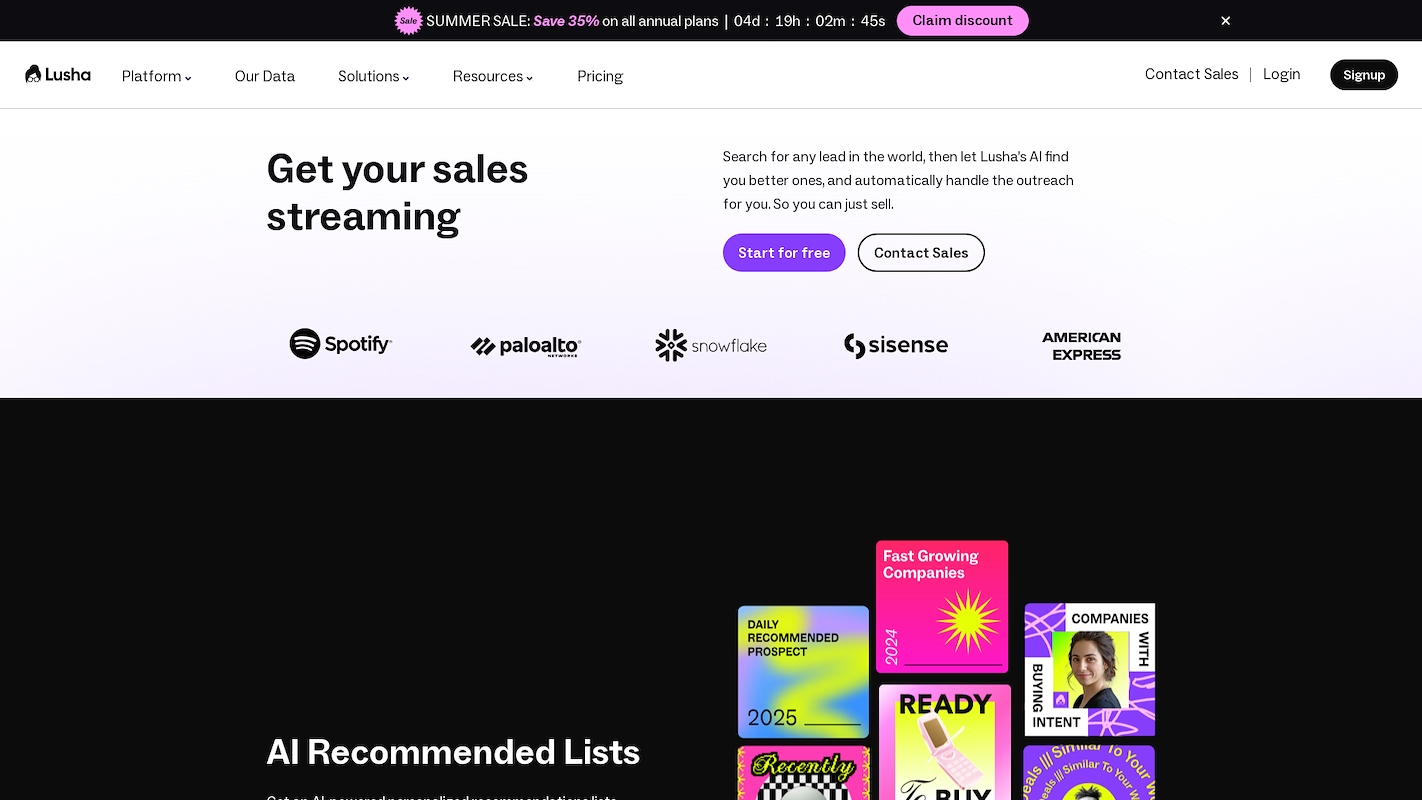
Lusha is a sales intelligence platform that helps revenue teams find B2B leads worldwide. The system uses AI to recommend similar prospects and can automate multichannel outreach within a single workflow.
It emphasizes global data coverage and compliance with standards like GDPR and CCPA. Teams use it to build prospect lists and integrate data into existing sales tools.
Lusha's Main Features
- Generates live, auto-updating lead lists that add new prospects at user-defined intervals.
- Records and analyzes sales meetings with its conversation intelligence tool.
- Automates and personalizes email sequences using AI-generated copy.
- Provides real-time notifications on buyer intent triggers and funding events.
How Lusha Compares to Cognism
Average Review score: 4.3/5 stars based on 1,516 G2 reviews.
- Lusha offers transparent pricing plans, including a free option for individual users. This provides more flexibility for smaller teams compared to Cognism's custom quote-based model.
- The platform uses AI Prospect Playlists to automatically generate and refresh lead lists. This is different from Cognism, where users often build static lists for their campaigns.
- It includes a conversation intelligence tool to record and analyze sales meetings. Cognism's core platform does not have a comparable feature for interaction analysis.
- The tool provides AI-generated copy to help automate and personalize email sequences. This is a feature not found in Cognism's primary data-focused offering.
Potential Drawbacks Compared to Cognism
- Some users report that Lusha's data for European markets is less complete. Cognism, by comparison, focuses heavily on data verification within Europe, which can result in more comprehensive profiles for contacts in that region.
- The platform's mobile number accuracy can sometimes vary. Cognism provides Diamond Data, which consists of manually verified mobile numbers, and this feature often results in higher connect rates for sales teams.
- Its two-way CRM sync may have limitations according to some user reviews. This might require more manual data updates compared to Cognism, which is built for deep integration with major CRM platforms.
Pricing and Cost-Effectiveness
Lusha provides transparent pricing with a free tier and paid plans starting at $36 per user per month, making it accessible for smaller teams. Cognism, in contrast, uses a custom quote-based model for its packages. You can check the detailed pricing on Lusha's official website.
4) Seamless.AI
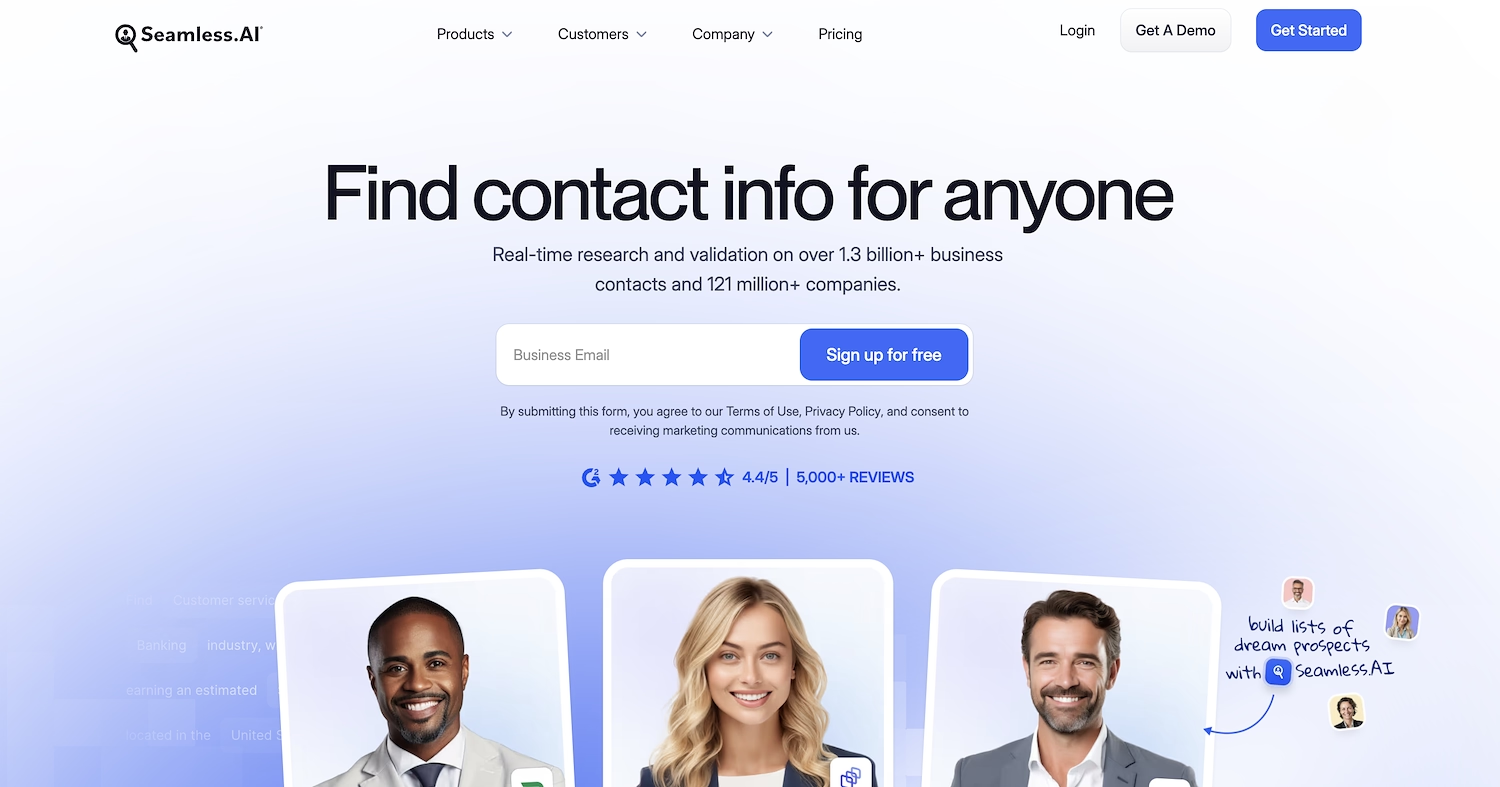
Seamless.AI is a sales intelligence platform with a real-time search engine for B2B contacts. It provides verified emails and direct-dial phone numbers. Sales teams use the platform to build lists of potential customers and connect with decision-makers. The system integrates with CRMs to help keep contact data current.
Seamless.AI's Main Features
- Surfaces buyer intent data to identify prospects who are ready to purchase.
- Monitors job changes among customers and prospects, automatically providing updated contact details.
- Generates research and personalized messages using AI pitch intelligence.
- Automates list-building with its Autopilot feature to maintain a full sales pipeline.
How Seamless.AI Compares to Cognism
Average Review score: 4.4/5 stars based on 5,067 G2 reviews.
- Seamless.AI's real-time search engine finds contact data on demand. This differs from Cognism's model, which relies on a pre-compiled, periodically updated database.
- The platform provides buyer intent data to identify prospects who are actively looking to buy. This is a different function compared to Cognism, which focuses on contact data provision.
- It automatically tracks job changes and updates contact information for prospects and customers. This offers a proactive approach to data maintenance not found in Cognism.
- The tool includes AI pitch intelligence to help generate personalized outreach messages. This sales enablement feature is distinct from Cognism's core data enrichment service.
Potential Drawbacks Compared to Cognism
- Some users report that Seamless.AI's data for European markets can be less accurate. Cognism, in comparison, often provides more reliable contact information for this region due to its focused data verification process.
- Its mobile phone data may not always be as accurate as Cognism's Diamond Data. Cognism manually verifies these numbers, which can result in higher connect rates for sales teams.
- The tool's real-time search for data can sometimes lead to inconsistencies. In contrast, Cognism's curated database model may provide more predictable data quality for specific campaigns.
Pricing and Cost-Effectiveness
Both Seamless.AI and Cognism use custom quote-based pricing, so costs vary based on package details. User-reported data suggests a faster return on investment for Seamless.AI at 9 months, compared to 10 months for Cognism.
5) SalesIntel
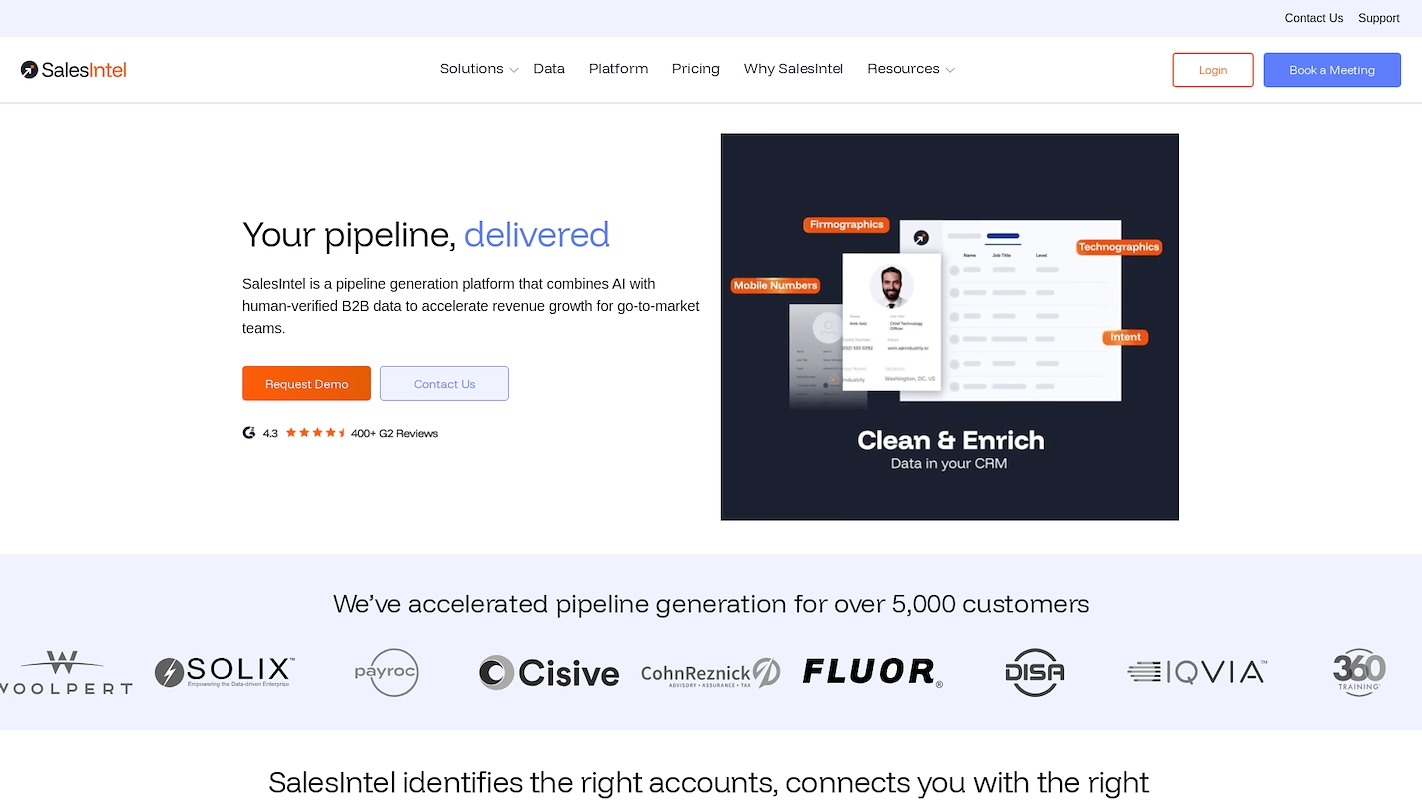
SalesIntel is a B2B data platform that provides contact and company information for sales and marketing teams. It offers human-verified data, with a focus on direct dials and mobile numbers to connect with decision-makers.
Professionals use the service to find prospects, enrich current data, and build account lists for outreach campaigns.
SalesIntel's Main Features
- It provides human-verified data with 95% accuracy and offers a research-on-demand service for contacts not yet in its database.
- The platform includes an evidence-based Ideal Customer Profile builder, ICPIntel, to help prioritize accounts.
- It uses AI agents to automate workflows like monitoring buyer intent signals and preparing outreach tasks.
- Its VisitorIntel feature identifies anonymous website visitors in real time to generate leads.
How SalesIntel Compares to Cognism
Average Review score: 4.3/5 stars based on 462 G2 reviews.
- SalesIntel provides human-verified data with a 95% accuracy guarantee. This offers a specific quality benchmark, while Cognism is often noted for the accuracy of its Diamond Data in Europe.
- The platform includes a research-on-demand service to find contacts not already in its database. This is a direct research function that Cognism does not offer.
- It has a VisitorIntel feature to identify anonymous website visitors. This provides an inbound lead source that is not a part of Cognism's core outbound data platform.
- The tool re-verifies its data every 90 days to maintain freshness. This systematic refresh cycle is a different approach to data maintenance compared to Cognism's update process.
Potential Drawbacks Compared To Cognism
- Some users report that SalesIntel's data coverage in Europe is not as comprehensive. In contrast, Cognism often provides more detailed and reliable contact information for this specific region.
- The platform's availability of direct mobile numbers can sometimes be limited. Cognism, with its Diamond Data feature, offers manually verified mobile numbers, which often leads to higher connection rates.
- Its research-on-demand service, while useful, can introduce a delay for contacts not already in the database. This is different from Cognism, which provides immediate access to its large, pre-compiled contact list.
Pricing and Cost-Effectiveness
Both SalesIntel and Cognism use custom quote-based pricing. User-reported data suggests a return on investment of 12 months for SalesIntel, compared to 10 months for Cognism. For detailed pricing, we recommend visiting SalesIntel's official website.
Try 11x for Your Sales Process
A digital worker can be a useful addition if your team spends significant time on manual tasks like prospect research. These agents handle specific parts of your sales workflow, which frees up your team to close deals and build customer relationships.
11x provides autonomous agents for these functions. You can explore their platform to see how they fit into your sales operations or book a demo to learn more.
With 11x, we run your sales playbook with AI. Our agent Alice finds accounts and drives outreach, while Julian qualifies leads and books meetings. The platform handles intent signals, data enrichment, and email warmup, so you do not need extra tools.
Book a demo to see it in action.
6) Clearbit
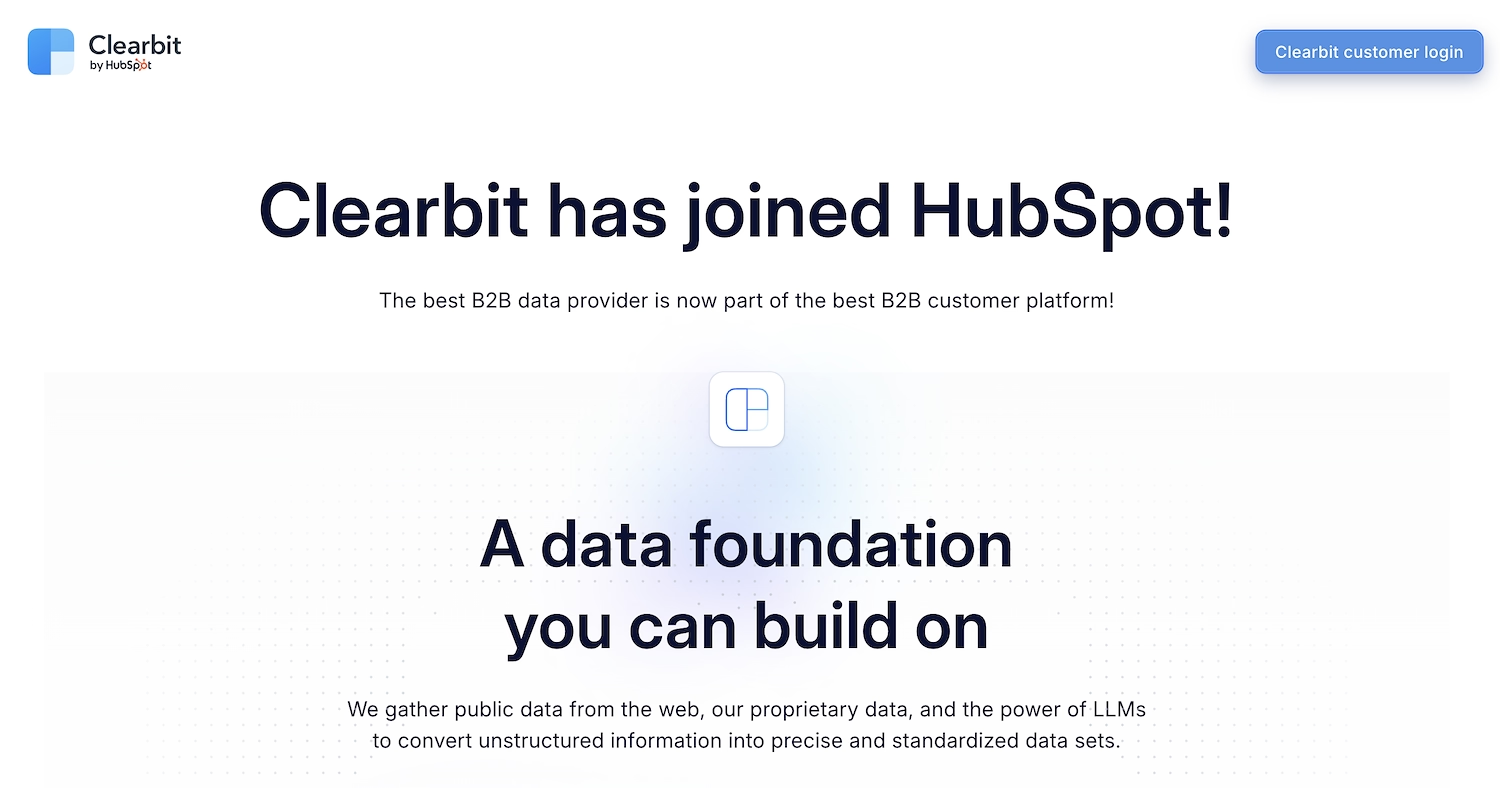
Clearbit is a data platform for go-to-market teams. It provides company and contact information to help sales and marketing departments identify and connect with prospects. The platform acts as a B2B database to build lead lists.
Users can find contact details, such as phone numbers, and enrich their CRM records. This data supports targeted outreach and helps teams understand their customer base.
Clearbit's Main Features
- Aggregates public web data, proprietary sources, and LLM processing to deliver standardized B2B datasets.
- Provides data for real-time lead scoring and routing using deep industry classifications like NAICS, GICS, and SIC.
- De-anonymizes website traffic to identify visiting companies that match a defined ideal customer profile.
- Removes form fields that can be automatically enriched to reduce friction on web forms.
How Clearbit Compares to Cognism
Average Review score: 4.4/5 stars based on 626 G2 reviews.
- Clearbit identifies anonymous website visitors with its Reveal feature. This provides an inbound lead source, which is different from Cognism's primary focus on outbound contact data.
- The platform can shorten web forms by auto-filling known data. This helps marketing teams increase lead conversion rates, a feature not central to Cognism's data provision service.
- It enriches records with over 100 data points, including company technology stacks. This offers a different kind of data depth compared to Cognism, which is noted for its manually-verified mobile numbers.
- The tool uses a combination of public web data and machine learning to build its datasets. This is a different approach to data sourcing compared to Cognism's curated database model.
Potential Drawbacks Compared to Cognism
- Some users report that Clearbit's data for European markets is less complete. Cognism, in contrast, often provides more comprehensive contact information for this region due to its specific focus on data verification there.
- The platform's mobile number accuracy can sometimes vary. In comparison, Cognism offers its Diamond Data feature, which consists of manually verified mobile numbers and can result in higher connect rates for sales teams.
- Its reliance on real-time data aggregation from public sources might occasionally result in data inconsistencies. Cognism's curated database model, by contrast, may provide more predictable data quality for specific outreach campaigns.
Pricing and Cost-Effectiveness
Both Clearbit and Cognism use custom quote-based pricing, and users perceive both as a significant investment. User-reported data suggests Cognism may offer a slightly faster return on investment at 10 months, compared to 11 months for Clearbit.
7) LeadIQ
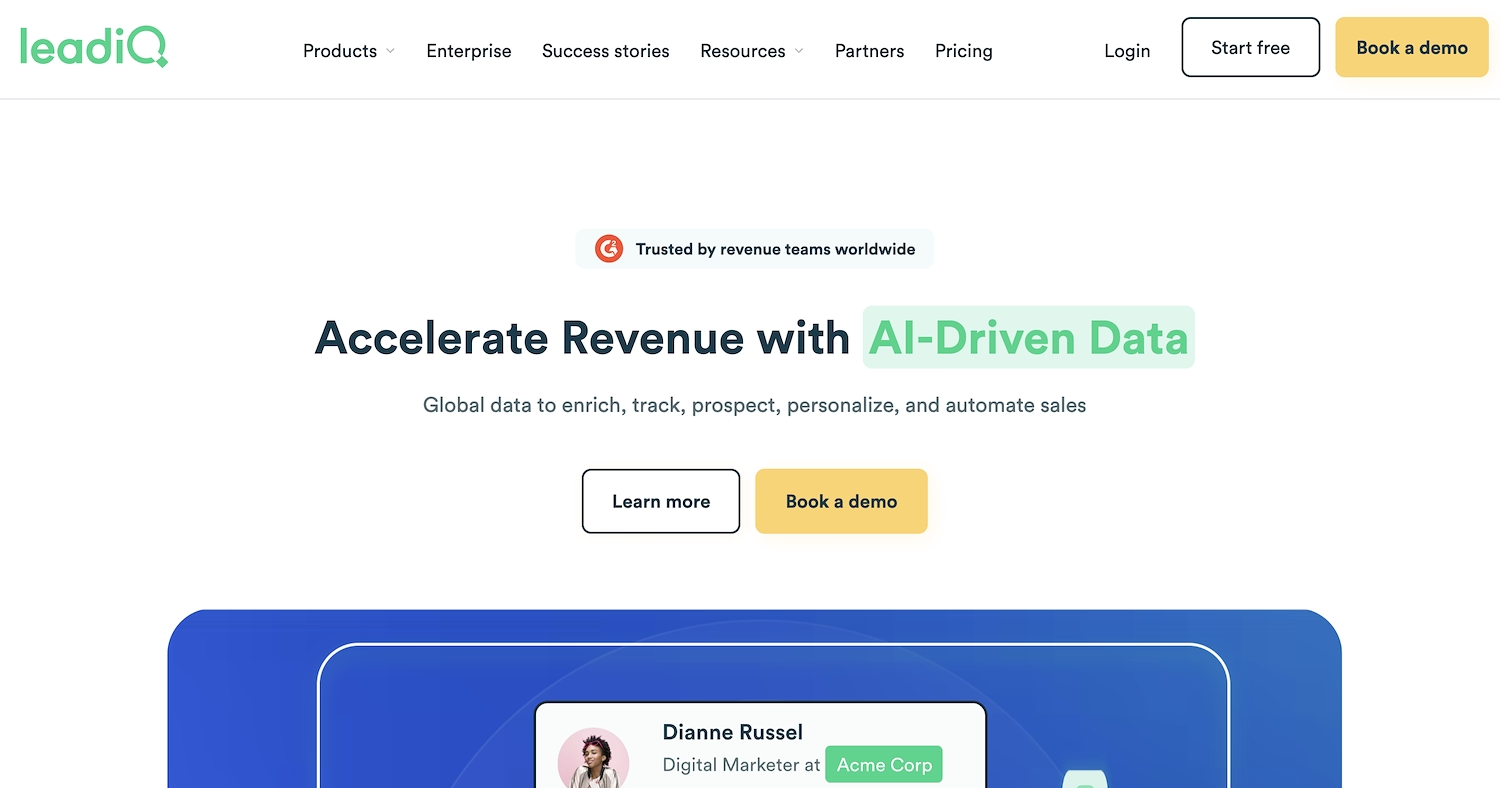
LeadIQ is a sales prospecting platform that provides contact data for B2B outreach. Teams use it to find verified email addresses and phone numbers of decision-makers. The tool helps build targeted prospect lists and supports sales campaigns.
It also enriches existing data and integrates with other sales software.
LeadIQ's Main Features
- Captures contact data from LinkedIn and syncs it to a CRM in one click.
- Generates personalized outreach messages using its AI tool, Scribe.
- Tracks job changes among contacts and sends alerts for timely follow-up.
- Surfaces buying signals, including funding rounds and G2 intent data.
How LeadIQ Compares to Cognism
Average Review score: 4.2/5 stars based on 1,097 G2 reviews.
- LeadIQ allows users to capture contact data directly from LinkedIn and sync it to a CRM. This offers a different workflow compared to Cognism, where users build lists within the platform's interface.
- The platform includes an AI tool, Scribe, to help generate personalized outreach messages. This is a sales enablement feature not found in Cognism's core data service.
- It tracks job changes for contacts and sends alerts for timely follow-up. This proactive data monitoring differs from Cognism's model, which relies on periodic database updates.
- The tool offers transparent pricing plans, including a free option for individual users. This provides more flexibility for smaller teams compared to Cognism's custom quote-based model.
Potential Drawbacks Compared to Cognism
- Some users report that LeadIQ provides less comprehensive data for European contacts. In comparison, Cognism places a strong emphasis on this region, which often yields more reliable information for teams that target Europe.
- The tool sometimes provides mobile numbers that are not up-to-date. This is different from Cognism's Diamond Data, a feature where numbers are manually checked for accuracy, which can improve connect rates.
- Its data capture workflow from public profiles might introduce inconsistencies. This differs from Cognism's curated database, which can offer more predictable data quality for large-scale campaigns.
Pricing and Cost-Effectiveness
LeadIQ offers transparent pricing with a free tier and paid plans starting at $45 per user per month. This makes it accessible for smaller teams, while Cognism uses a custom quote-based model aimed at enterprise clients, requiring direct contact for pricing details.
8) Kaspr
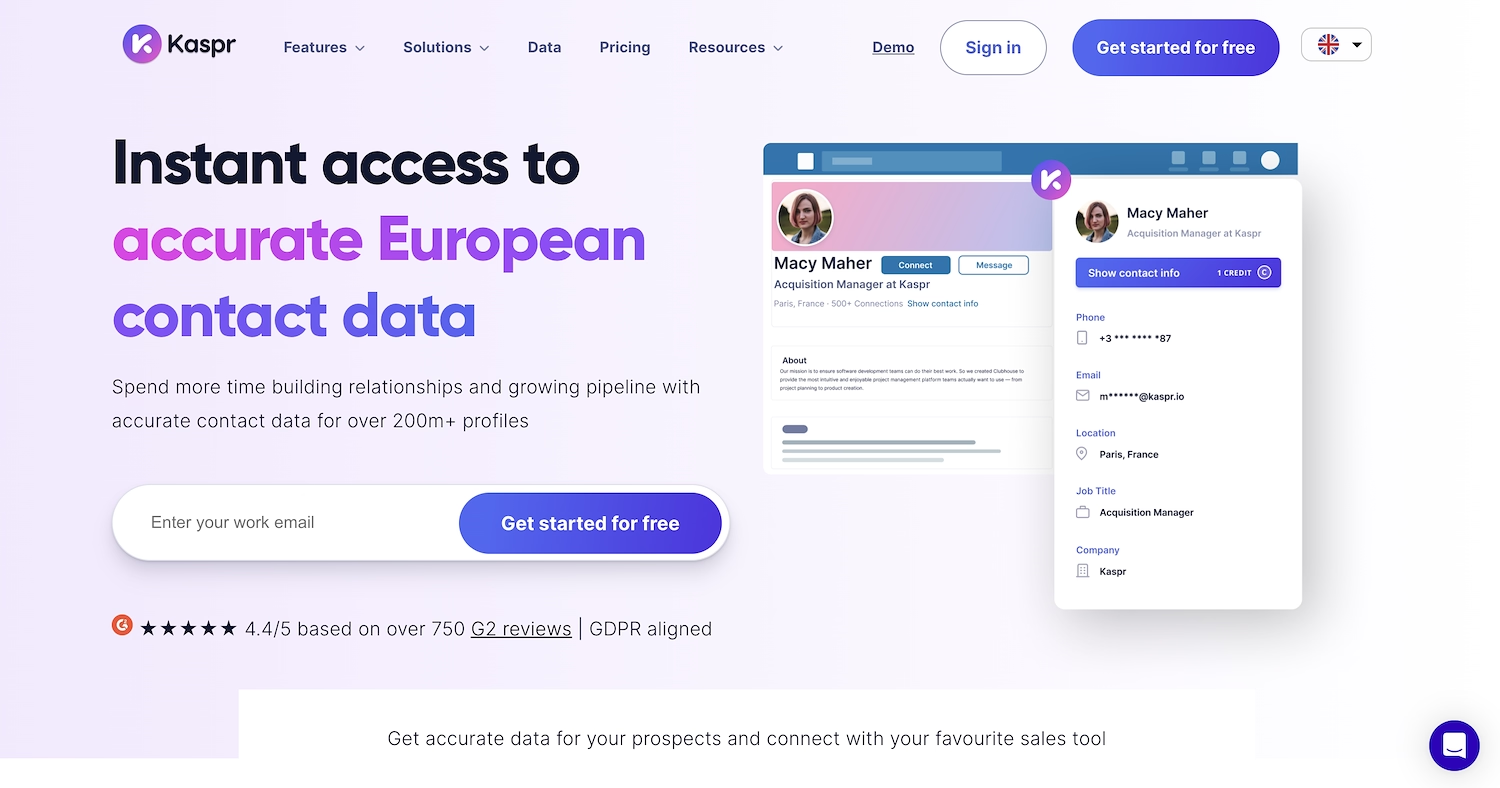
Kaspr is a sales intelligence tool that provides B2B contact data. Sales teams and recruiters use its browser extension to find phone numbers and email addresses from LinkedIn profiles. The platform helps users build prospect lists for outreach campaigns.
It also automates parts of the sales process and integrates with CRM and sales applications. This allows teams to sync contact information and manage workflows.
Kaspr's Main Features
- Retrieves contact details from LinkedIn profiles using a Chrome extension.
- Creates and automates LinkedIn outreach campaigns to engage prospects.
- Enriches prospect data within the platform's management dashboard.
- Integrates with various sales applications to sync contact information.
How Kaspr Compares to Cognism
Average Review score: 4.4/5 stars based on 825 G2 reviews.
- Kaspr uses a Chrome extension to find contact data directly on LinkedIn profiles. This workflow differs from Cognism, where users search within a self-contained database.
- The platform provides transparent pricing plans, including a free option. This gives more flexibility for smaller teams than Cognism's custom quote-based model.
- It includes features to create and automate LinkedIn outreach campaigns. This is different from Cognism, which primarily provides contact data and often requires an export to another tool for campaign management.
- This tool offers unlimited B2B email addresses on its free plan. This provides value for users with basic needs, unlike Cognism's enterprise packages that lack a free tier.
Potential Drawbacks Compared To Cognism
- Some users report that Kaspr's data for European markets is less complete. Cognism, in comparison, focuses on data verification within Europe, which can result in more comprehensive profiles for contacts in that region.
- The tool's mobile number accuracy can sometimes vary. This is different from Cognism's Diamond Data, a feature with manually verified mobile numbers that can improve connection rates for sales teams.
- Its features for bulk data tasks might have limitations for very large campaigns. Cognism, on the other hand, is designed to build extensive contact lists directly from its large, pre-compiled database.
Pricing and Cost-Effectiveness
Kaspr offers transparent pricing with a free plan and paid tiers starting at $49 per user per month. In contrast, Cognism uses a custom quote-based model aimed at enterprise clients, so pricing is not publicly listed. This makes Kaspr a more accessible option for individuals and small teams looking for predictable costs.
9) UpLead
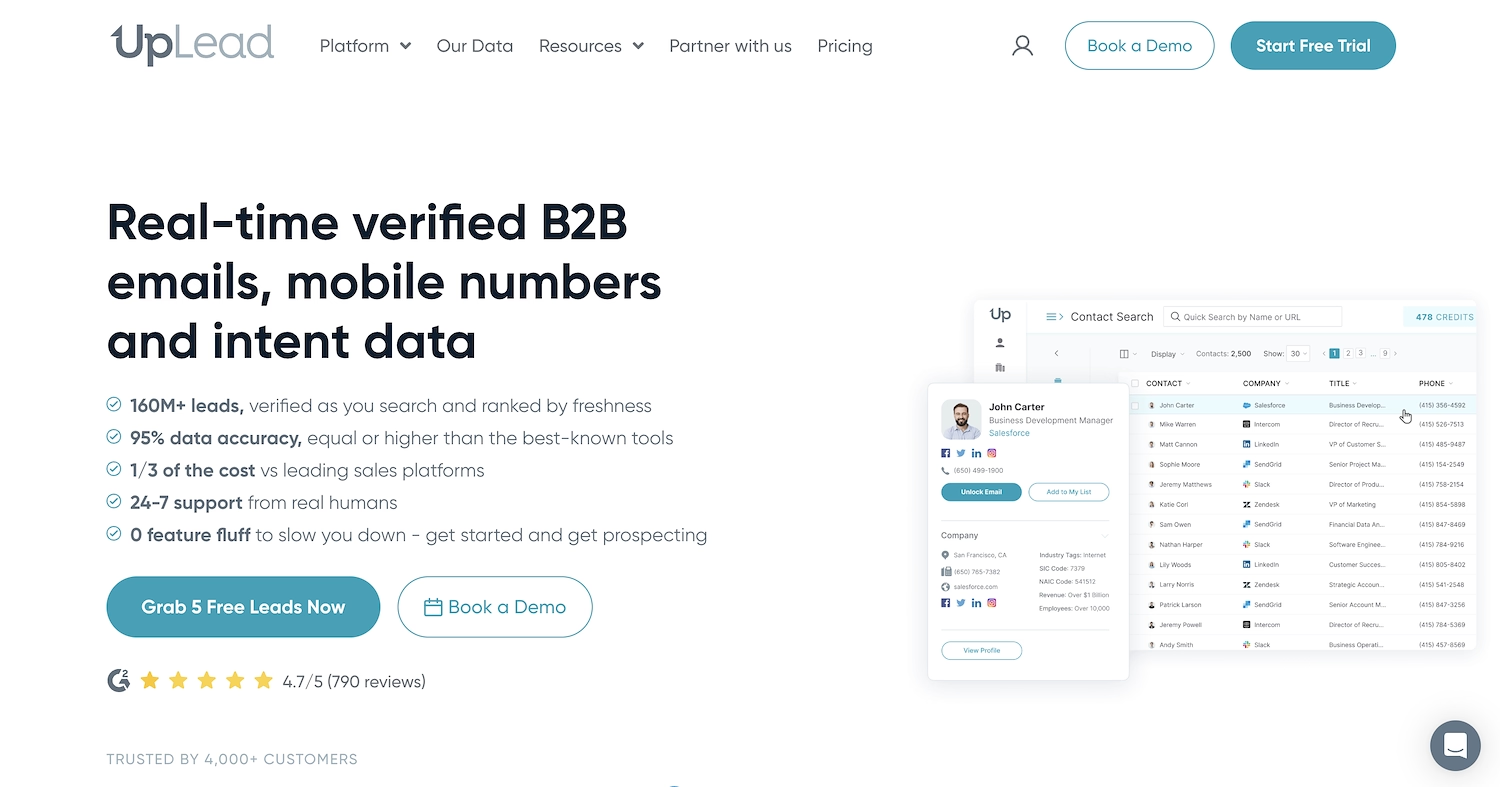
UpLead is a B2B data platform that provides contact and company information with a 95% accuracy guarantee. It offers verified email addresses and direct-dial phone numbers for sales and marketing teams.
Users can build targeted prospect lists, find new customers, and enrich existing contact records within their CRM.
UpLead's Main Features
- Offers over 50 search filters, including buyer intent data, to build targeted lead lists.
- Verifies emails in real-time to ensure data accuracy at the point of capture.
- Enriches contact and company data to clean and update CRM records.
- Provides access to industry research data for additional market context.
How UpLead Compares to Cognism
Average Review score: 4.7/5 stars based on 797 G2 reviews.
- UpLead provides real-time email verification at the point of capture. This approach differs from Cognism's periodically updated database and helps reduce bounce rates.
- The platform offers a 95% data accuracy guarantee. This provides a specific quality benchmark, while Cognism is noted for the accuracy of its manually-verified Diamond Data.
- This tool offers transparent pricing plans and a free trial. This allows teams to test the platform and predict costs, which is different from Cognism's custom quote-based model.
- Users can apply over 50 search filters, including buyer intent data, to build specific lists. This offers granular targeting, while Cognism is often highlighted for its data depth in Europe.
Potential Drawbacks Compared To Cognism
- Some users report that UpLead's data coverage in Europe is less comprehensive. Cognism, in contrast, often provides more reliable contact information for this specific region.
- Its mobile number accuracy can sometimes be inconsistent. This differs from Cognism's Diamond Data, which consists of manually verified numbers and may result in higher connect rates.
- The platform's reliance on real-time verification might occasionally return outdated information. Cognism's curated database model, by contrast, can provide more predictable data quality for large campaigns.
Pricing and Cost-Effectiveness
UpLead offers transparent pricing with paid plans starting at $99 per month, making it a predictable option for smaller teams. In contrast, Cognism uses a custom quote-based model for its enterprise packages. You can check the detailed pricing on UpLead's official website.
10) RocketReach
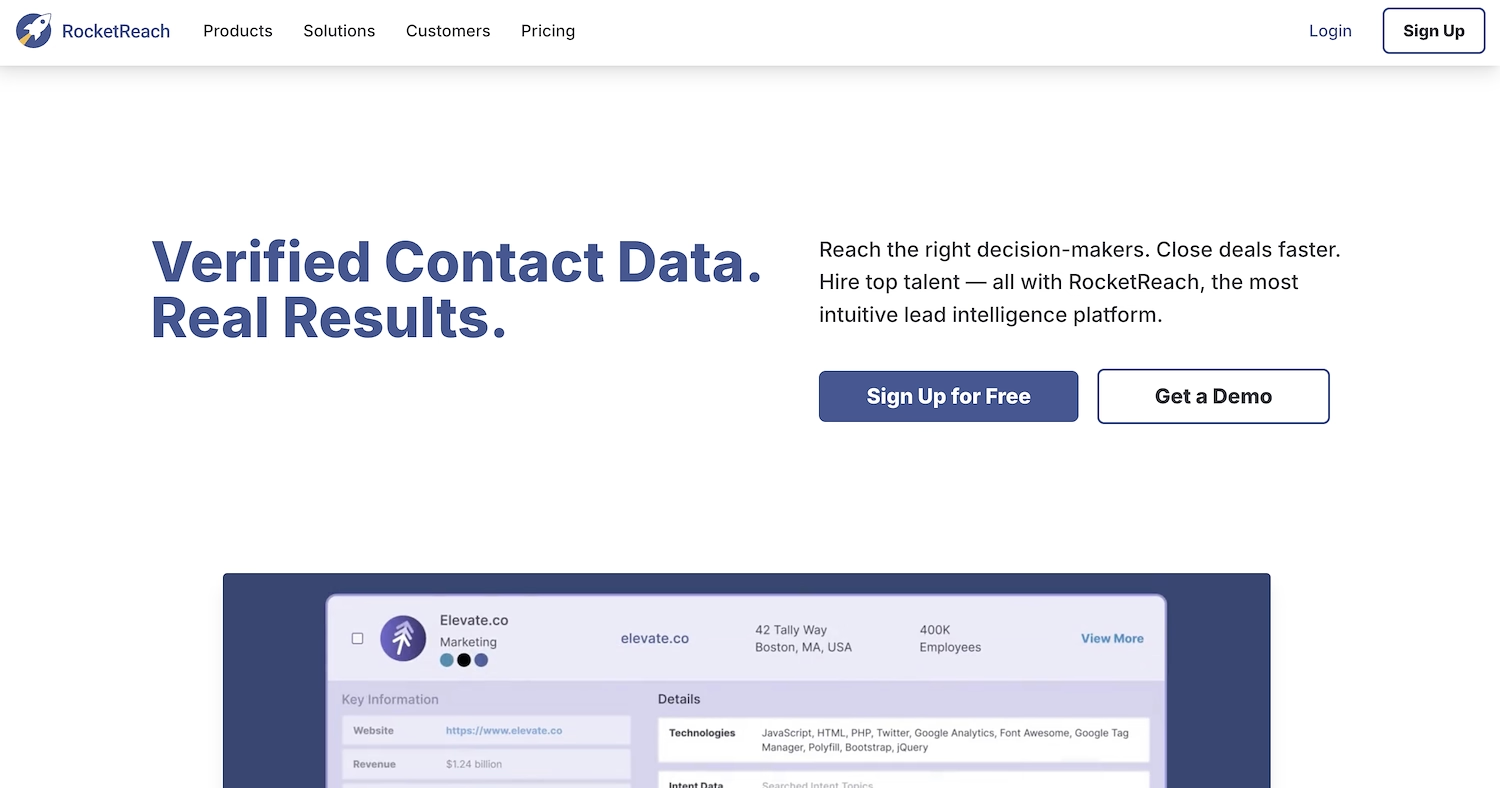
RocketReach is a platform with a B2B database of contact and company information. Sales teams and recruiters use it to find professional profiles. The service provides verified emails and phone numbers to help users connect with decision-makers.
Teams can build prospect lists for outreach campaigns or enrich their existing data. It functions as a tool for lead generation and supports sales workflows.
RocketReach's Main Features
- Provides access to a database of over 700 million professionals and 35 million companies.
- Offers browser extensions for Chrome and Edge to find contact information.
- Includes an Autopilot feature to create automated workflows for prospect discovery.
- Uses intent data to help build targeted contact lists for marketing campaigns.
How RocketReach Compares to Cognism
Average Review score: 4.4/5 stars based on 918 G2 reviews.
- RocketReach provides access to a database of over 700 million professionals. This offers a larger scale for prospect discovery compared to Cognism, which focuses on data depth in specific regions like Europe.
- It offers browser extensions for Chrome and Edge to find contact data. This workflow is different from Cognism, where users typically search for contacts within the main platform interface.
- The tool has transparent pricing plans, including a free option. This provides more flexibility for smaller teams than Cognism's custom quote-based model for enterprise packages.
- The platform offers specialized data for the healthcare industry. This provides targeted information for a specific sector, which is a different focus from Cognism's broader B2B data provision.
Potential Drawbacks Compared To Cognism
- RocketReach's data coverage for European contacts can sometimes be less thorough. In contrast, Cognism focuses heavily on this region, which may result in more reliable information for teams targeting Europe.
- The accuracy of its mobile numbers can be inconsistent at times. This differs from Cognism's Diamond Data, a feature with manually verified numbers that often improves connect rates for sales teams.
- Its large database might occasionally contain outdated information due to its scale. Cognism's curated database model, by contrast, may provide more predictable data quality for specific outreach campaigns.
Pricing and Cost-Effectiveness
RocketReach offers transparent pricing with paid plans starting at $99 per month, making it a predictable option for smaller teams. Cognism uses a custom quote-based model for its enterprise packages. For detailed pricing, visit RocketReach's website.
Which Cognism Alternative Should You Choose?
Choosing a Cognism alternative depends on many factors, including your target market, budget, and existing tech stack. This guide reviewed several options to help you find the right fit for your sales team's specific needs.
If your team spends significant time on manual tasks, consider adding a digital worker to your sales process. 11x provides autonomous agents that handle prospect research and outreach, which allows your team to focus on closing deals.


